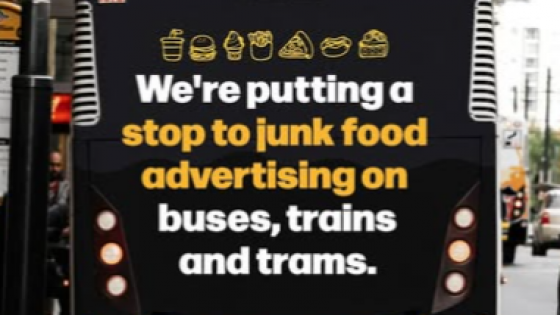
- About Us
- Our Ministers
- Strategies and Priorities
- Grants and Funding
- Governance and Reporting
- Aboriginal Inclusion
- Reconciliation
- Diversity, Equity and Inclusion
- Suicide Prevention Action Plan
- Careers
- News
- Contact Us
Bus stops here for junk food advertising

Saturday, 4 January 2025
The state government is taking action to tackle obesity by becoming the first state to ban junk food advertising on public buses, trains and trams.
From 1 July 2025, images of unhealthy products such as chocolate, lollies, confectionary, desserts, ice creams, soft drinks and chips will not be permitted on Adelaide Metro buses, trains and trams.
Obesity has overtaken tobacco as the leading risk factor contributing to disease burden in Australia. In 2024, overweight and obesity attributed to the burden of over 30 diseases and accounted for 8.3 percent of total disease burden in Australia.
Around 63.1 per cent of adults and 35.2 per cent of children across South Australia are overweight or obese.
Modelling indicates that if no action is taken, the number of South Australians living with overweight or obesity is expected to grow by an additional 1,900 children and 48,000 adults over the next five years. In addition, recent research commissioned by Preventive Health SA shows that without action, children born in 2023 could see as much as a seven-month reduction in life expectancy because of obesity.
South Australian children are regularly exposed to unhealthy food and drink advertising. Data from Cancer Council SA shows that almost 80 per cent of food and drink advertisements on South Australian buses promote unhealthy food and drinks.
This new policy demonstrates the government’s commitment to reduce children’s exposure to unhealthy food and drink advertising on assets it manages and owns. The government will be considering additional measures to further respond to this public health issue in 2025.
Advertising of unhealthy food and drinks has long been recognised as having a harmful impact on the diets of children. There is a consistent body of evidence that demonstrates that food and drink marketing can affect a child’s nutrition knowledge, food preferences and consumption patterns.
Preventive Health SA, in partnership with the Department for Infrastructure and Transport, are leading the implementation of this policy which aims to reduce exposure to unhealthy food and drink marketing which is associated with a reduction in the purchase of these products.
This evidence-based policy has been informed by a public consultation process, which sought to understand the perspective and feedback of key stakeholders including public health organisations, the food and beverage industry, and the advertising industry.
The changes follow the implementation of similar policies in London, Amsterdam, and the Australian Capital Territory.